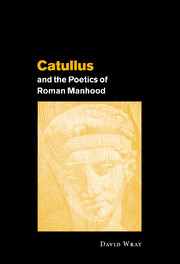1 - Catullan criticism and the problem of lyric
Published online by Cambridge University Press: 08 October 2009
Summary
All the new thinking is about loss. In this it resembles the old thinking.
Robert Hass, “Meditation at Lagunitas”“CELEBRATE YOUR CATULLUS”
New thinking from a new book: a fair enough expectation, even when the new book is a literary study of an ancient poet, and even when the ancient poet is Catullus. But if “new thinking” is to mean thinking away the intervening centuries to reveal a timeless classic preserved under the aspic of eternity, then new thinking about Catullus is neither possible nor even desirable. The tradition of an ancient text – both the discourse that transmits and mediates that text (reception) and the discourse that the text itself mediates (intertext) – is not an obstacle to its proper understanding, something to be set aside, got over. Rather, its ancient and modern tradition is precisely that thing which renders Catullus' text comprehensible in the first place. Forgetting reception history, including scholarly reception (starting with all those emendations of a garbled text), would be as helpful to a reading of Catullus as forgetting the Roman alphabet.
Still, there is a sense within Catullan studies that surely we can do better than the Romanticism of the nineteenth century and the neo-Romanticism of much of the twentieth. Surely we have done better already. The work of T. P. Wiseman, combining detailed historical reconstruction, informed speculation, and an insistence on reading Catullus' text as a poetry collection rather than the novelistic journal of a love affair with its entries shuffled, is one example of how much better we have done.
- Type
- Chapter
- Information
- Catullus and the Poetics of Roman Manhood , pp. 1 - 35Publisher: Cambridge University PressPrint publication year: 2001



